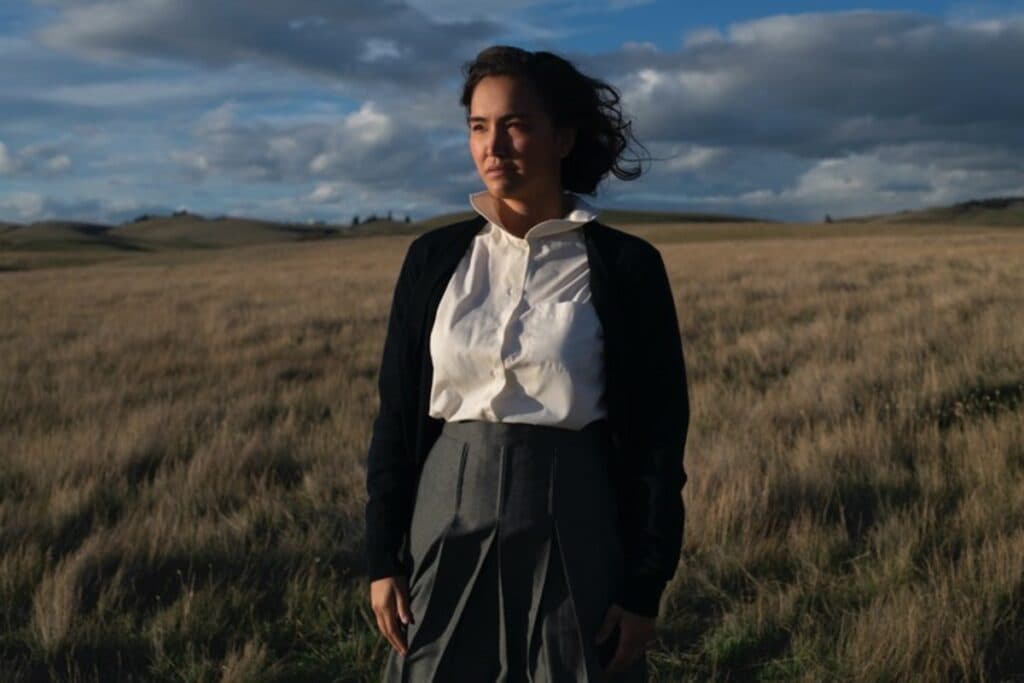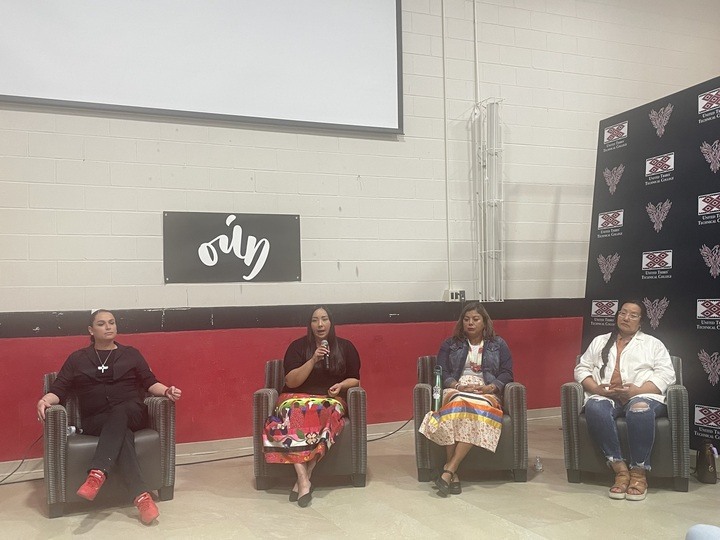
Aline Spears (Grace Dove) persevered as a code talker for the Canadian Air Force despite enduring the harsh realities of Indian boarding schools. Photo credit/Ayasew Ooskana Pictures Inc.
In front of the Vatican, a now gray-haired survivor of a Manitoba residential school faces her abuser and calls out those who kidnapped Indigenous children.
The speaker is Aline Spears, a Cree woman who survived the residential school system in the 1930s to become a code talker for the Canadian Air Force during World War II. Played by Grace Dove in the 2022 Canadian drama Bones of Crows, Spears’ story has been streamed throughout North America since the film’s release in June.
In Bismark’s United Tribes Technical College, 50 community members filled rows of seats to watch the powerful film for the National Day of Truth and Reconciliation on Sept. 29.
Orange Shirt Day North Dakota presented the film and led a panel discussion at UTTC about the forced systematic assimilation of Indigenous children sent to Indian boarding schools across North America in the 19th and 20th century. Agnes Yellow Bear, one of the organizers, said it’s time for American Indian communities to learn, speak up and say something.
“As uncomfortable as it is, we have to tell the truth so that we can have true healing,” Yellow Bear said.
The film delves into different aspects of Indigenous experiences, including forced removal from the land, the brutal conditions of the residential schools, Missing and Murdered Indigenous Women, alcoholism and suicide. Former North Dakota State Rep. Ruth Buffalo said through this movie, the audience could see how intergenerational trauma manifested from generation to generation.

The impacts of the Indian boarding schools have disrupted Indigenous communities across Canada and the United States. Individuals face a loss of identity, low self-esteem, lack of a sense of safety and difficulty in forming healthy relationships, according to The National Native American Boarding School Healing Coalition. Families experience a loss of parental power and near destruction of the extended family system. Tribal communities lose their language, their traditions and a sense of community.
Yellow Bear discussed how the trauma caused by the boarding schools affects some Indigenous families’ ability to fully show their love and care for one another.
“By nature each of us sort of carry some of those remnants with us today, whether it’s unkind behavior or unconscious behavior, which may have been passed from generation to generation,” Yellow Bear said.
According to a 2012 study by The American Journal of Drug and Alcohol Abuse, 63% of Two-Spirit residential school survivors weren’t allowed to speak their Native language. Another 29% reported being sexually assaulted or abused while at school. About 34% of survivors were physically harmed. In terms of the lasting trauma from the boarding schools, 75% of Two-Spirit survivors are also reported to more likely have attempted suicide or experienced suicidal thoughts in their lifetime.
While Buffalo found the film to be a tough and emotionally charged two hours to get through, she took some good things away from the film. “For the main character, what I loved to see is that she was breaking that cycle within her family, even though she endured so much in her life,” Buffalo said.
“As uncomfortable as it is, we have to tell the truth so that we can have true healing,”
Agnes Yellow Bear, organizer for panel discussion
Sharing Bones of Crows sets the stage for some difficult conversations, but as Jennifer Martel, the Sitting Bull Visitor Center coordinator, said during the panel discussion, “this is how we as Indigenous people begin to heal.” She said that families should be the first to step up and check in on survivors.
“It shouldn’t take so long for our own communities to take care of one another,” Martel said.
Indian boarding school attendees are often stuck in survival mode, said Yellow Bear. Sometimes, it’s difficult for family members who attended these schools to open up and acknowledge their experiences.
“Our older relatives had to learn to be parents, learn how to heal, learn when it’s safe to speak their language,” said Yellow Bear. “It’s important for all of us to understand that this did happen.”
Martel said that even though this healing process may take time, it’s important to be available and fully present when survivors have the courage to speak up. The best way to support family members who went to boarding schools is to be there for them.
“I hope that you make your home better and check on your relatives that have been a part of the boarding schools,” said Martel. “Please take care of them. Take care of one another.”
Adrianna Adame
Former Indigenous Democracy Reporter
Location: Bismarck, North Dakota
See the journalist page© Buffalo's Fire. All rights reserved.
This article is not included in our Story Share & Care selection.The content may only be reproduced with permission from the Indigenous Media Freedom Alliance. Please see our content sharing guidelines.
The tree features names of missing Indigenous people
The billboard project is expanding to Oregon
Identification not yet made
UTTC International Powwow attendees share their rules for a fun and considerate event
Radio collaboration highlights importance of cooperation in a season of funding cuts for local media







